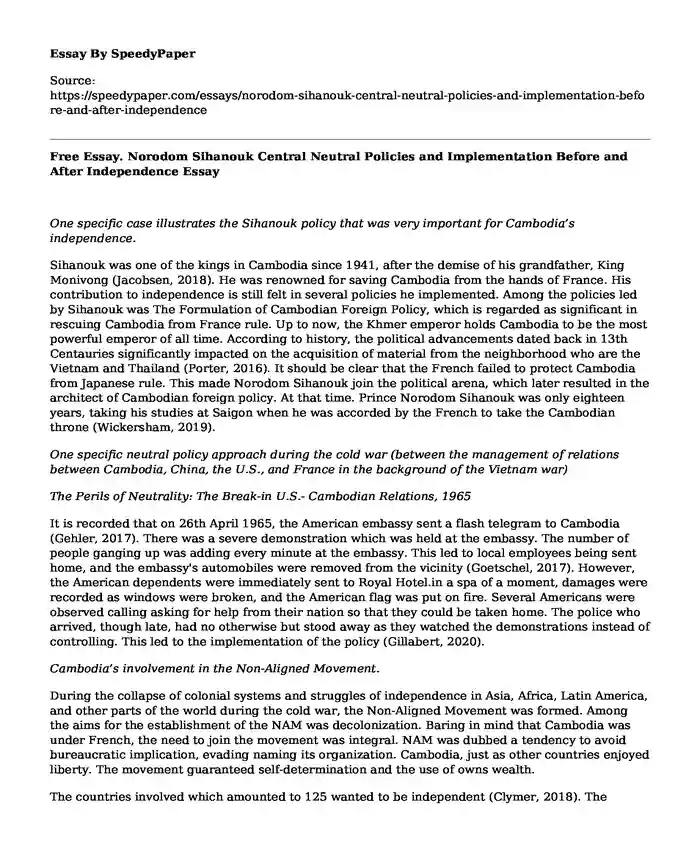
| Type of paper: | Essay |
| Categories: | Politics History Policy analysis |
| Pages: | 3 |
| Wordcount: | 701 words |
One specific case illustrates the Sihanouk policy that was very important for Cambodia’s independence.
Sihanouk was one of the kings in Cambodia since 1941, after the demise of his grandfather, King Monivong (Jacobsen, 2018). He was renowned for saving Cambodia from the hands of France. His contribution to independence is still felt in several policies he implemented. Among the policies led by Sihanouk was The Formulation of Cambodian Foreign Policy, which is regarded as significant in rescuing Cambodia from France rule. Up to now, the Khmer emperor holds Cambodia to be the most powerful emperor of all time. According to history, the political advancements dated back in 13th Centauries significantly impacted on the acquisition of material from the neighborhood who are the Vietnam and Thailand (Porter, 2016). It should be clear that the French failed to protect Cambodia from Japanese rule. This made Norodom Sihanouk join the political arena, which later resulted in the architect of Cambodian foreign policy. At that time. Prince Norodom Sihanouk was only eighteen years, taking his studies at Saigon when he was accorded by the French to take the Cambodian throne (Wickersham, 2019).
One specific neutral policy approach during the cold war (between the management of relations between Cambodia, China, the U.S., and France in the background of the Vietnam war)
The Perils of Neutrality: The Break-in U.S.- Cambodian Relations, 1965
It is recorded that on 26th April 1965, the American embassy sent a flash telegram to Cambodia (Gehler, 2017). There was a severe demonstration which was held at the embassy. The number of people ganging up was adding every minute at the embassy. This led to local employees being sent home, and the embassy's automobiles were removed from the vicinity (Goetschel, 2017). However, the American dependents were immediately sent to Royal Hotel.in a spa of a moment, damages were recorded as windows were broken, and the American flag was put on fire. Several Americans were observed calling asking for help from their nation so that they could be taken home. The police who arrived, though late, had no otherwise but stood away as they watched the demonstrations instead of controlling. This led to the implementation of the policy (Gillabert, 2020).
Cambodia’s involvement in the Non-Aligned Movement.
During the collapse of colonial systems and struggles of independence in Asia, Africa, Latin America, and other parts of the world during the cold war, the Non-Aligned Movement was formed. Among the aims for the establishment of the NAM was decolonization. Baring in mind that Cambodia was under French, the need to join the movement was integral. NAM was dubbed a tendency to avoid bureaucratic implication, evading naming its organization. Cambodia, just as other countries enjoyed liberty. The movement guaranteed self-determination and the use of owns wealth.
The countries involved which amounted to 125 wanted to be independent (Clymer, 2018). The presence of Cambodia in the non-aligned movement was significant. This is evident when the Cambodian issued a split in the non-alignment movement (Clymer, 2018). According to literature, this was seen as a metaphor. Since Cambodian was a small nation and the Non-Align Movement aimed to abandon the United States and other big countries, the need for it to remain in the movement was vital.
References
Clymer, K. (2018). The United States and Cambodia, 1960–1991. In Cambodia and the West, 1500-2000 (pp. 147-175). Palgrave Macmillan, London.
Gehler, M., Goetschel, L., Grafeneder, S., Hopmann, P. T., Hyde-Price, A., Leidenmühler, F., ... & Stadler, L. (2017). Engaged Neutrality: An Evolved Approach to the Cold War. Lexington Books.
Gillabert, M., & Milani, P. (2020). Communicating neutrality: public diplomacy by neutral states at the beginning of the Cold War. European Review of History: Revue européenne d'histoire, 1-23.
Goetschel, L. (2017). Are Neutral States Middle Powers?. Engaged Neutrality: An Evolved Approach to the Cold War, 103.
Jacobsen, T. (2018). Independence to Disaster, 1945–1975. In Cambodia and the West, 1500-2000 (pp. 115-145). Palgrave Macmillan, London.
Lüthi, L. M. (2016). The Non-Aligned Movement and the Cold War, 1961–1973. Journal of Cold War Studies, 18(4), 98-147.
Porter, G. (2016). 13 Cambodia’s Foreign Policy. The Political Economy of Foreign Policy in Southeast Asia, 247.
Wickersham, A. (2019). An Enigma to Washington: The Political Ideology of Cambodia’s Norodom Sihanouk (1945-1970). Footnotes: A Journal of History, 3, 119-129.
Cite this page
Free Essay. Norodom Sihanouk Central Neutral Policies and Implementation Before and After Independence. (2023, Aug 20). Retrieved from https://speedypaper.net/essays/norodom-sihanouk-central-neutral-policies-and-implementation-before-and-after-independence
Request Removal
If you are the original author of this essay and no longer wish to have it published on the SpeedyPaper website, please click below to request its removal:
- Free Essay on Theological, Racial and Gender Bias, Critical Conscious and Determined Women
- Roots Migrants: Transnationalism and Return Among Second-Generation, Free Essay
- Essay Example Exploring Differences in Business Culture
- Theory and Practice of Diplomacy - Essay Sample on Foreign Policy
- Paper Example. Practical Ideas for Reform on Violence Against Children
- Changes in Race Relations from Reconstruction - Paper Example
- Team Reasoning: Navigating Dilemmas in Politics and Business - An Analytical Essay
Popular categories




